



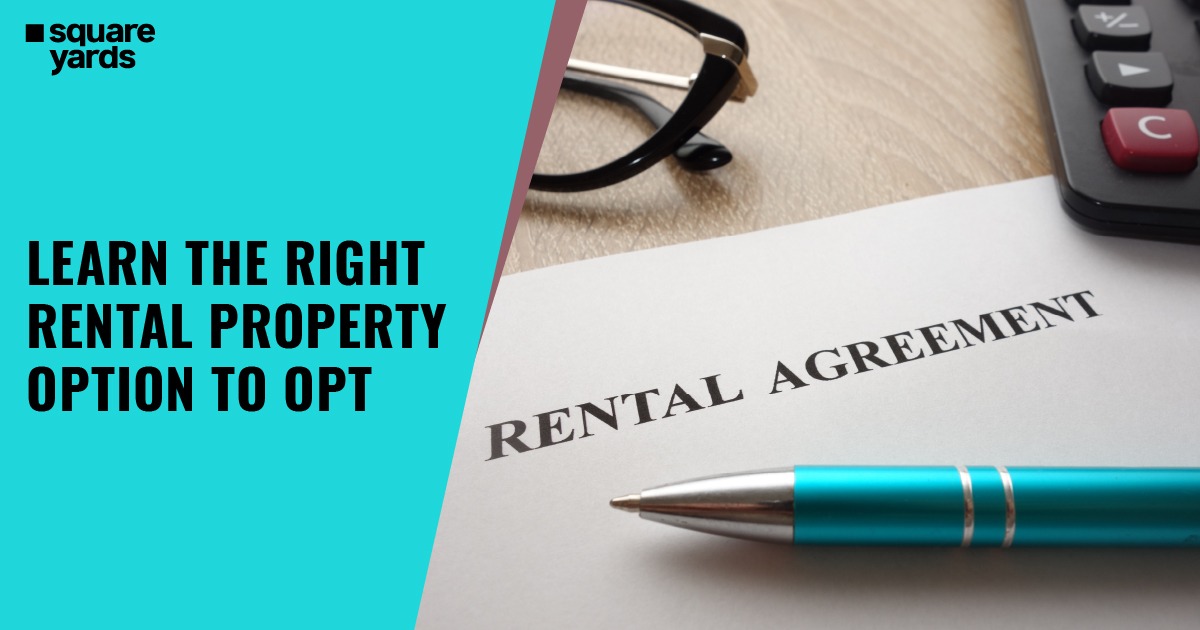
Finding and evaluating rental spaces can pose challenges, requiring multiple steps. These include exploring various options, considering preferences and needs, and choosing a suitable location. However, with thorough research, planning, and utilising the right resources, you can simplify this process and increase the likelihood of finding your ideal rental space. Let’s check the key factors you should consider when looking for rental space and how to analyse the qualities of a better rental property. Why Location is Key: Tips for Finding Your Ideal Rental Space When searching for the perfect rental property, it is important to consider some essential factors. One of them is location. Let's understand why locations have such significance and what you should remember. Convenience: Look for a location that makes your life easier. Find a rental property near grocery stores, schools, hospitals, bus stops or railway stations. These facilities save you time and effort and make your daily routines smoother. Transportation Accessibility: A good location ensures effortless transportation from your place to another. Seek rental properties near public transportation hubs or major roads, which allows you to commute to work easily, school and other destinations without hassle. Safety And Security: Your safety is paramount. Opt for a safe rental space in a neighbourhood with low crime rates and secure surroundings. Feeling secure where you live fosters a sense of relaxation and lets you enjoy your home to the fullest. Neighbourhood Amenities: Consider the offerings of the neighbourhood. Living near parks, shopping centres, restaurants, and recreational facilities enhances your quality of life. Having these amenities within reach allows you to easily participate in the activities you enjoy. Employment Opportunities: Take your work into account. Residing near thriving job markets and employment centres reduces your commute time and expenses. It grants you more personal time and lessens the stress of long-distance travel. The Layout Of The Rental Property: Why is it Essential? When searching for a rental apartment, consider the layout and type of the property for a reason. Bedrooms And Bathrooms: Think about how many bedrooms and bathrooms you will need for your family to occupy a household. It is crucial to ensure there is enough space for everyone. No one likes to live in a cramped space. Low-rise or High-rise: There are two options - Low rise, a building with just a few floors or a High-rise, tall building with five and above floors. Choose one of these based on your personal preferences and priorities. Open or Closed Concept: Consider whether you'd like a rental space with a closed layout, where rooms are separate, or an open layout, where rooms flow into each other. Your Preferences and Needs: Consider your preferences and needs for your living space. Do you enjoy hosting gatherings? Then an open layout might be suitable. Do you value privacy and distinct areas for different activities? Then a closed layout might be more appealing. Choose the rental space that matches your vibe based on your preferences and the space you need. Natural Light and Ventilation: Look for a rental space with more windows that allow light and good airflow. Natural light and fresh air can significantly enhance the comfort and ambience of your living area. A well-designed rental property with good lighting and ventilation can positively impact your daily activities, mental health, work, and overall well-being. Comfort and Convenience: Ensure the rental space’s layout provides you with the desired space and storage needs. A designated workspace or a comfortable area might be important if you work from home. Privacy and Personal Space: If you are searching for renting property for a joint family, consider your need for privacy and personal space. Having separate rooms or areas to spend your time and personal space with your loved ones is essential. Essential Services and Amenities to Look for When Renting an Apartment Once you have finalised the area and the size and design of the rental space, it is time to think about the services and amenities offered in your new home. Services Maintenance Services Ensure the building has reliable maintenance services if anything needs fixing in your apartment. Package Delivery Find out if the building has a system for receiving and keeping your packages safe. 24/7 Emergency Support It is good to know if someone is available to help you in case of urgent problems like plumbing or electrical issues. On-site management Having someone on-site can make communicating and addressing concerns about your apartment or the building easier. Rental Amenities To Consider Balcony or Outdoor Space If you prefer enjoying a cup of tea outside or having your private outdoor area, look for a rental space with balconies or communal outdoor spaces. Parking The apartment complex should provide designated parking spaces for your vehicle(s). Storage Consider whether the apartment offers extra storage space like lockers or closets to help you organise your space. Secure Fob Entrance It is a good idea to find out if the building has a secure access system like key fobs or electronic key codes to ensure the safety of residents. CCTV Surveillance It is important to have CCTV in an apartment complex for the security of its residents. Wrapping Up Finding the perfect rental space and choosing one from hundreds of options involves considering important factors like location, layout, and amenities. The right location offers convenience, transportation access, safety, and nearby amenities. The perfect rental space layout should suit your needs and preferences and provide comfort, privacy, and natural light. Additionally, consider the services and amenities available, such as maintenance support and parking. Considering all these aspects, you can find a rental space that enhances your daily life and meets your requirements. If you feel overwhelmed or lost, it is best you contact a real estate expert or broker for guidance. They can help you find your dream home that satisfies all your needs. FAQs The typical duration of a lease agreement for rental apartments is usually one year. This standard term provides tenants and landlords with a sense of stability and security. The lease terms may vary depending on local laws and landlord preferences. Some leases may be shorter, such as six months. Others may be longer, like two years or more. So, carefully review and understand the lease agreement terms before signing. In most cases, tenants can do some decoration work and changes to the apartment, such as painting the walls or installing shelves. However, it is better to read the lease agreement and seek permission from the landlord beforehand. Some landlords may have specific guidelines or restrictions on the modifications allowed. Maintaining open communication with the landlord and obtaining written consent is crucial. Pet policies may differ between rental properties. Some apartments may permit pets with specific restrictions or additional fees, while others may strictly prohibit them. To avoid any complications, it is crucial to inquire about the pet policy before finalising your rental decision if you have furry companions. It can help you find a pet-friendly apartment that aligns with your needs and preferences, providing a welcoming home for you and your beloved pets.

The Art of Choosing the Perfect Rental Property Finding the perfect property can be thrilling but daunting. Whether you're a primary-time renter or a person looking to trade their living state of affairs, it's vital to recollect numerous elements that can greatly impact your typical pleasure with the assets. In this tenant's guide, we will explore the reasons that should be decisive in finding your ideal rental space. Factors to Consider When Looking for a Rental Property Location One of the essential factors to consider while looking for the right property is its locality. The place can drastically impact your day-by-day lifestyle, shuttle, and standard comfort. Start by finding the property's proximity to your job or educational institution. Consider the accessibility to public transportation, essential roads, and highways to ensure smooth and time-efficient travel. Price and Affordability Determining your price range and expertise in the current marketplace is crucial to find the right property. Choose a practical approach and evaluate your financial situation to decide how much you can comfortably pay monthly rent. Remember to consider other costs, including utilities, parking, and preservation expenses, that may not be included in the property rate. It's also worth exploring if there are any extra expenses or hidden costs associated with the belongings, security deposits, or protection prices. By putting finances and know-how into the condominium market, you can narrow your search and attention to properties that align with your monetary abilities. Amenities and Facilities Another important factor to consider when looking for the perfect property is the presence of amenities and establishments that meet your needs and preferences. Consider vital functions, including laundry, parking, fitness, swimming pools, or communal areas. Additionally, check if the property offers adequate storage space and if it meets any specific requirements you may have, such as pet-friendly policies or accessibility features for individuals with disabilities. Prioritise your lifestyle's essential amenities and facilities to ensure a comfortable and convenient living experience. Lease Terms and Flexibility Before signing any rental agreement, carefully review the lease terms and conditions. Pay attention to the duration of the lease, rent escalation clauses, and any restrictions that may impact your living arrangements. Assess the level of flexibility the landlord or property management provides in case of unforeseen circumstances. Consider Future Needs Anticipate your future needs and evaluate whether the property can accommodate them. If you plan to expand your family, ensure that the property has enough bedrooms or the potential for additional space. If you work remotely or require a home office, look for properties with a dedicated workspace or a layout that allows for a comfortable work environment. Thinking ahead will save you from having to move again. Maintenance and Upkeep Assess the level of maintenance required for the property. Determine whether you are comfortable with the responsibilities of maintaining the property, such as lawn care or regular repairs. If you prefer a more hands-off approach, consider properties with property management services or included maintenance packages. Community and Social Opportunities Evaluate the community and social opportunities available. If you value community and enjoy socialising, look for neighbourhood properties with community centres, parks, or social clubs. Research local events, festivals, and activities that can contribute to a vibrant social life. Factors to Overlook When Looking for a Rental Property What Not to Consider? Why? Superficial Aesthetic While it's natural to be attracted to visually appealing properties, it's essential not to let superficial aesthetics be the sole determinant of your decision. Remember that the interior design or decor can be changed to suit your preferences. Temporary Trends Trends come and go, and it's important not to prioritise them when choosing a rental property. What may be fashionable today could become outdated tomorrow. Emotional Attachments It's easy to develop an emotional attachment to a property, especially if it reminds you of a cherished or sentimental memory. However, it's crucial to prioritise practicality over your sentiments. Why Choosing the Right Rental Property is Important? Enhancing Your Quality of Life: Your Home, Your Sanctuary Finding the right property can greatly enhance your quality of life. Your home should be where you feel comfortable, safe, and at peace. Consider factors like the property's layout, natural lighting, noise levels, and proximity to amenities that contribute to a harmonious living environment. Financial Considerations: Maximising Value for Money Renting a property is a financial commitment, and finding the right property ensures you maximise value for your money. Assess the rental price of the property's location, amenities, and overall condition. It's important to strike a balance between affordability and the features that are important to you. Stability and Security: Building a Solid Foundation A stable and secure living situation is essential for peace of mind. Finding the right property means selecting a place where you feel safe and secure. Consider factors such as the neighbourhood's crime rates, security measures in the building or community, and the property's structural integrity. To Sum Up Finding the right property is a decision that should be approached with careful consideration. Focusing on decisive factors such as practicality, long-term value, and enhancing your quality of life ensures that your chosen property aligns with your needs and preferences. Conduct thorough research, engage with local experts, and trust your instincts. By following these guidelines and pro tips, you'll be well-equipped to navigate the market and find the perfect property that feels like home. Happy house hunting! FAQs The location of a property plays a significant role in your overall living experience. It affects your daily routine, commute times, access to amenities, and the overall vibe of the neighbourhood. Choosing a convenient location that aligns with your lifestyle and preferences can save you time and reduce stress. Considering factors such as proximity to your workplace, schools, public transportation options, grocery stores, parks, and entertainment venues is crucial. You can ensure a more comfortable and convenient living experience by prioritising location. Prioritising rental prices or amenities depends on your circumstances and priorities. While rental price is important to stay within your budget, compromising on essential amenities may impact your quality of life. It's essential to balance affordability and the amenities that are important to you. Assess your long-term needs and evaluate whether the rental price justifies the amenities' value. Prioritising rental prices and amenities will help you find a property that meets your requirements and fits your budget. Visiting a property in person is highly recommended before making a decision. While online photos and descriptions provide some insight, being physically present allows you to assess the property fully. You can evaluate its condition, layout, natural lighting, noise levels, and overall ambience. Walking through the space helps you visualise yourself living there and determine if it meets your needs and preferences. It also allows you to identify potential issues or concerns that may not be apparent through pictures alone. By visiting in person, you can make a more informed decision and ensure the property feels like a comfortable home.
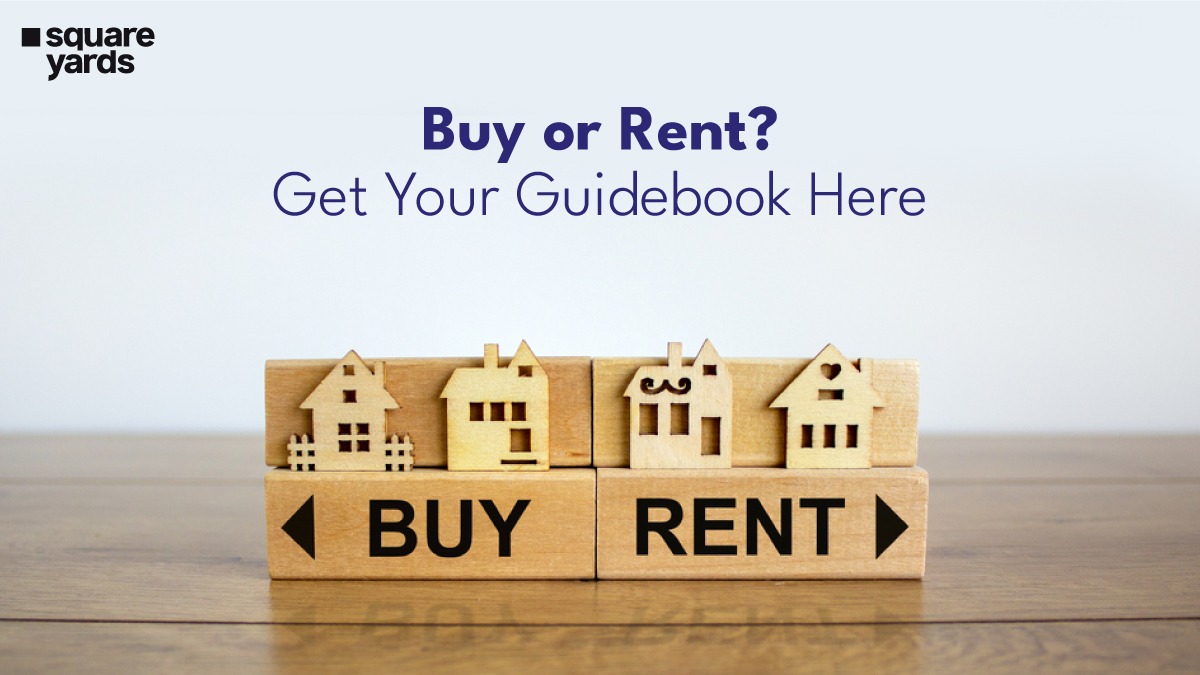
Rent or Buy: A Tenant's Guide to Choosing the Superior Option Are you torn between considering rent vs buy a property? It's a choice that can impact your financial future and lifestyle. In this tenant's guide, we'll explore the pros and cons of renting and buying, presenting you with the necessary facts to make a knowledgeable decision. So, let's dive in and look at the elements that assist you in determining whether or not renting or purchasing is the superior choice for you. Factors that Affect Your Decision - Rent or Buying? Financial Considerations Renting Lower Upfront Costs: Renting generally requires a smaller upfront investment, as you only need to cover a security deposit and possibly the first month's rent. Limited Control: Renting means you don't have control over the property, and rent payments do not contribute towards building equity. Buying Building Equity: One of the number one blessings of purchasing a property is that your loan payments contribute towards building fairness, which can ultimately be a treasured property. Stability: Buying a property gives balance and the freedom to customise and adjust your house. Upfronts Costs: Buying a property often calls for a big upfront investment, which includes a down price, final fees, and capability protection prices. Lifestyle Factors Renting Flexibility to Move: If your career or personal circumstances require frequent relocation, renting may be a better option, as it allows you to move easily to different areas. Minimal Responsibility: Renting generally means fewer responsibilities regarding property maintenance and repairs, as these are usually the landlord's responsibilities. Buying Long-time Period Commitment: Buying a property is an extended-term commitment that calls for stability and a willingness to settle in a selected region for an extended duration. Personalisation: Owning your own property allows you to personalise and customise your space to your liking. Market Conditions Rent Market Fluctuations: Rental prices are subject to market conditions, and while they can increase over time, they may offer more short-term stability than owning a property. Limited Control over Costs: As a renter, you have limited control over rental price increases or changes in property management policies. Buying Potential Appreciation: Buying a property allows you to benefit from the appreciation in the estate market, which could increase your property's fee over the years. Market Risks: Owning property can also make you vulnerable to market risks. Sometimes, you might experience your property's value decreasing and feel disappointed. Additional Key Considerations for Rent VS Buy Properties There are additional factors to consider when renting or buying a property. These include - Rent Considerations Rental Agreement: Understand the terms and conditions of your rental agreement, including lease duration, rent escalation clauses, and restrictions on modifications or pets. Landlord Relationship: Explore the importance of a positive landlord-tenant relationship and its role in ensuring a smooth renting experience. Rental Insurance: Discuss rental benefits that protect your personal belongings and liability coverage. Buying Considerations Mortgage Options: Explain the various types of mortgages available and their associated terms, such as fixed and adjustable mortgages, to help readers understand their options. Home Inspection: Emphasise the significance of a thorough home inspection before purchasing a property, as it can uncover potential issues and help negotiate repairs or adjustments in price. Additional Costs: Highlight the expenses involved in homeownership, such as property taxes, homeowners association fees, and maintenance costs, to give readers a comprehensive understanding of the financial obligations. Red Flags to Keep an Eye on When Renting or Buying a Property Issues Why? Long-Term Financial Feasibility If renting consistently costs you more than what you would pay for a mortgage on a similar property, it could be a red flag. Renting should be more affordable in the short term. Limited Rental Options If you're struggling to find suitable rental properties that meet your needs or the rental market is highly competitive with limited availability; buying may be a better option. Lack of rental options or constant turnover in the rental market can lead to instability and inconvenience. Limited Control and Restrictions If you desire more control over your property or want the freedom to make modifications, renting may not be the ideal choice. Some rental agreements may have strict rules regarding alterations or limited control over the property's appearance. Financial Constraints If your financial situation is unstable, you're struggling with debt, or you're unable to secure a mortgage with favourable terms, it may be a red flag that buying is not the right choice. Renting, at this point, is financially feasible for you. Lack of Desire for Maintenance Responsibilities Owning a property comes with maintenance responsibilities, both financially and time-wise. If you're not interested in or capable of managing maintenance tasks or unexpected repairs, renting may be a more suitable option. Wrapping Up Choosing between renting and buying requires conscious attention to your financial scenario, lengthy-time period goals, lifestyle alternatives, and marketplace conditions. While renting gives flexibility, lower premature expenses, and restricted protection responsibilities, it can lack the lengthy-term economic advantages and balance of homeownership. On the other hand, buying belongings allows for building equity, customising your space, and gaining from property appreciation, but it comes with better advance prices and long-term commitments. To make the right choice, determine your monetary capacity, evaluate your plans, and bear in mind factors inclusive of market stability, condo availability, and preservation alternatives. Trust your instincts, seek professional advice, and weigh the pros and cons based on your situation. FAQs Renting is not a waste of money for many individuals. It offers advantages such as flexibility, lower upfront costs, and minimal responsibility for maintenance. While renting doesn't build equity like homeownership, it can be a financially viable option, especially for those who prioritise mobility or have uncertain plans. Buying is not always the superior choice over renting. The decision depends on factors like personal circumstances and preferences. While buying a property provides long-term stability, potential appreciation, and customisation opportunities, it requires higher upfront costs, long-term commitment, and responsibility for maintenance. Renting may suit those valuing flexibility, lower financial risks, and limited maintenance responsibilities. Financial aspects include budgeting for rent or mortgage payments, considering additional costs like utilities and maintenance, evaluating your ability to afford the property, and reviewing financing options or rental affordability.
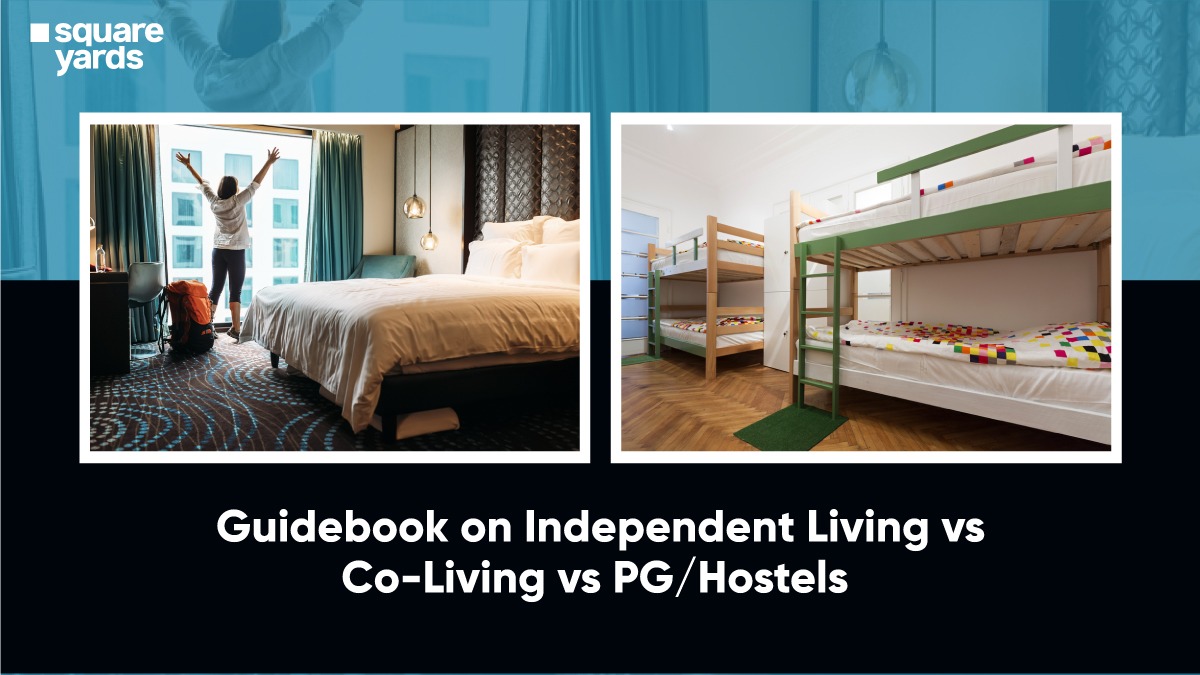
Choosing the Right Lifestyle: Independent Living, Co-Living, or PG/Hostels? Finding a cosy place to live can be difficult when moving to a new city or even within the same city. Whether searching online or visiting different options like PGs (paying guest accommodations), co-living spaces, or hostels, discovering a new home takes time and effort. To make the process easier, consider whether you prefer living alone or being around many people and activities. Additionally, consider your budget before making a final decision. What are Independent Living, Co-living and PG? A paying guest, or PG, is a renter who stays in a private residence owned by another individual. You won't find any multi-bedroom PGs in your immediate area. In addition, whether or not you have to pay extra for utilities like power, water, and housekeeping is entirely up to the property owner's discretion. In a co-living space, individuals of different genders live together in a shared home and enjoy cooking, cleaning, and socialising as a group. People living in co-living spaces come together for activities such as reading, playing games, and watching movies. Independent living refers to a living arrangement where individuals, typically adults, have the freedom and ability to live on their own without relying on others for assistance with daily tasks. It implies controlling one's life and making decisions independently, including managing personal care, household chores, finances, and overall lifestyle choices. Some of the Common Differences Between Independent Living, Co-Living and PG Here's a table that summarises some of the key distinctions between independent living, co-living, and PG (Paying Guest) arrangements: Aspect Independent Living Co-Living PG Living Space Self-contained units (apartments, houses) Shared spaces (rooms, common areas) Shared rooms in a residential property Autonomy Complete independence and autonomy Moderate level of independence Limited independence and more rules/restrictions Financial Responsibility Rent/mortgage and utility payments Rent payments Rent payments and additional charges for meals/utilities Responsibilities Responsible for personal upkeep and tasks Shared responsibilities for common areas Limited responsibilities, more managed by the host Amenities and Services It may include facilities like a gym, pool, etc. Shared amenities like kitchen, living room Basic amenities like furniture, Wi-Fi, etc. Flexibility Can choose a preferred location and lifestyle Limited flexibility based on the co-living model Location and facilities determined by the host Support and Assistance Limited to emergency assistance Limited support from housemates and manager Some support from the host in case of issues Factors To Consider While Choosing A Living Arrangement In cities; countless PG and co-living choices offer safe and secure housing to students, working professionals, and bachelors. Before selecting a PG and co-living place, consider the following important elements. Transportation & Connectivity Although convenience to your school or business is a top priority, you should also ensure that your chosen area has good public transportation options. You should easily access various city regions via various convenient transportation options. This will make it so your PG is conveniently connected to the rest of the city whenever you need to travel to other locations. Facilities Shopping around for the best amenities is important if you're in the market. Hygiene, extra space, furnishings, Wi-Fi, microwave, air conditioning, refrigerator, washing machine, television, sufficient security, adaptability, and nice common areas. Price The price should be your first consideration when looking for a place to stay as a paying guest. First, see whether you are considering any affordable PGs in the area. To find the best PG for your needs, you need to strike a balance between the two. Confines When deciding on a co-living situation, it's important to remember that you'll be spending a lot of time and resources with people you might not know very well at first. It's best to seek places occupied by people with whom you get along well because you'll be sharing amenities like restrooms and toilets and even cooking and dining, including shopping. For example, some vegans would not feel comfortable sharing a home, kitchen, or refrigerator with non-vegetarians. Co-living Spaces Every room has a bed, a dressing table, and a study/work desk. The houses and apartments where these rooms are rented out have all the necessary household amenities. This is advantageous because it eliminates the need to obtain these items separately. Summary Hostels and paying guest accommodations are similar in many ways. However, some essential factors are needed, such as cost, living circumstances, and cultural immersion. PGs often offer a comfortable and homelike environment, allowing you to immerse yourself in the local culture. On the other hand, hostels provide a more affordable option for communal living. When selecting the two options, it's important to consider the price, accessibility, comfort and convenience. So, the aim is to pick a place to live that fits your needs and makes your life comfortable. FAQs Hostels are typically the most cost-effective alternative available, particularly in terms of price, and they provide accommodations that are kind to one's wallet for a shorter duration. PG (Paying Guest) lodgings and certain co-living spaces can also give affordable options; however, the costs may vary based on the location, features, and services. Shared living spaces and certain private room accommodations are often more flexible than other types of accommodations when it comes to hosting guests and allowing changes to return dates. Unlike traditional rentals, these arrangements usually have a standardised process for managing guests. They may offer more flexible lease terms or shorter commitments. Through the use of a variety of internet platforms and websites, it is possible to locate boarding homes, hostels, and shared living areas. Popular websites such as Airbnb, Hostelworld, and Booking.com, in addition to specialised websites dedicated to co-living, have extensive listings of these types of lodgings. In addition, local classifieds, websites specialising in real estate, and social media groups specialising in your region can all be valuable resources while looking for these various possibilities.

Locality Hunt: Unveiling the Hidden Gems for Your Dream Home Embarking on the quest for the perfect locality is like embarking on a grand adventure. It's a journey that leads you down winding streets, through vibrant communities, and into the heart of a place you'll call home. As you search for the ideal neighbourhood, you will unearth a treasure trove of possibilities, each locality offering its unique charm and allure. In this guide, we will uncover the city's secrets, showing you all the options available, revealing the hidden treasures, and ultimately assisting you in finding the ideal neighbourhood that suits you. Get ready for an exciting journey where every neighbourhood offers a new adventure and the opportunity to create the best chapter of your life. All of this can be found within the boundaries of the perfect locality. Searching for the Best Locality Define Your Priorities Begin by clearly defining what matters most to you. Consider factors such as proximity to work or school, transportation options, safety, amenities, recreational spaces, and the overall atmosphere. This will help you narrow your search and focus on what truly matters. Conduct Thorough Research Using online resources, local forums, and social media groups to gather neighbourhood information. Read about the area's history, demographics, crime rates, and community initiatives. Online maps can also provide insights into the proximity of essential services and amenities. Explore the Neighbourhoods Nothing beats first-hand experience! Once you've shortlisted a few potential areas, take the time to visit them in person. Stroll through the streets, chat with locals, and visit parks, cafes, and shopping centres. Immerse yourself in the neighbourhood's vibe to understand whether it resonates with your lifestyle and preferences. Factors to Consider for the Best Locality Safety and Security A safe neighbourhood should be a top priority. Look for areas with low crime rates, well-lit streets, and visible security measures. Check if there are police stations, fire stations, and hospitals nearby, as their presence is crucial in times of emergencies. Accessibility and Transportation Consider the neighbourhood's proximity to your workplace, schools, and public transportation options. Easy access to bus stops, train stations, or major highways can significantly enhance your daily commute and convenience. Amenities and Services Evaluate the availability of essential amenities, such as grocery stores, pharmacies, healthcare facilities, and recreational areas. Access to parks, gyms, libraries, and community centres can contribute to a vibrant and well-rounded lifestyle. Quality of Schools For families with children, the quality of schools in the area is crucial. Research local educational institutions, their reputation, and their performance. Access to good schools can greatly impact your child's educational journey. Community and Lifestyle Every neighbourhood has its unique charm and atmosphere. Consider the community's values, diversity, and the presence of local events or festivals. Look for a neighbourhood that aligns with your interests, hobbies, and desired lifestyle. Choosing a Locality: A Checklist of Important Factors High Crime Rates Excessive criminal activity is a clear red flag. Research the crime statistics of the area, paying attention to recurring patterns. Speak with local law enforcement or residents to gain further insights. Lack of Basic Amenities It might hinder your day-to-day life if an area lacks essential amenities like grocery stores, healthcare facilities, or schools. Evaluate if the inconvenience is worth compromising on other desirable factors. Poor Maintenance Observe the overall upkeep of the neighbourhood. Dilapidated buildings, unkempt parks, or neglected infrastructure can indicate a lack of community pride and potential issues with property management. Noise and Pollution Consider the noise levels, especially if you value peace and tranquillity. Busy roads, airports, or industrial zones nearby might lead to excessive noise and pollution, impacting your quality of life. Limited Diversity and Inclusivity A diverse and inclusive community fosters a sense of belonging and promotes a vibrant atmosphere. Consider the level of diversity in terms of cultures, backgrounds, and lifestyles to ensure a welcoming and accepting environment. Rapid Development or Decline Keep an eye on the neighbourhood's growth rate. Rapid growth may bring new opportunities and challenges, such as increased traffic congestion and potential changes to the area's character. Similarly, a declining neighbourhood may indicate a lack of investment and potential future issues. Top Localities in India Here is a list of top localities to consider if you relocate. Localities Reason Bandra West, Mumbai Trendy and upscale neighbourhood Excellent dining and entertainment options Close proximity to the beach Adyar, Chennai Well-established residential area Proximity to educational institutions and healthcare facilitiesSerene ambience Vasant Vihar, Delhi Upscale locality with luxurious homes Green surroundings and parks Prestigious schools and diplomatic community Indira Nagar, Banglore Vibrant and lively neighbourhood Thriving food and nightlife scene Accessible location with good connectivity To Sum Up Finding the perfect locality requires research, exploration, and consideration of various factors. By defining your priorities and conducting thorough research, you can identify neighbourhoods that align with your lifestyle and preferences. Remember to consider safety, accessibility, amenities, and community engagement while remaining vigilant for red flags like high crime rates, lack of basic amenities, or poor maintenance. As you embark on your adventure to locate the correct neighbourhood, consider your instincts and take it slow in making a knowledgeable selection. By doing so, you'll grow the possibilities of locating a locality that now meets your instant needs and will become an area you can call home. Best of luck in your search for the perfect locality. FAQs When selecting a community to rent an apartment, it is essential to recollect elements which include safety, proximity to amenities, transportation options, first-rate colleges, the community's atmosphere, and affordability. Additionally, evaluating the neighbourhood's noise ranges, getting the right of entry to inexperienced spaces, availability of parking, and capability for destiny development can also play a large function in making a knowledgeable selection that aligns with your way of life and choices. Ensuring the safety of a neighbourhood before moving in is essential. You can start by researching crime rates through online resources or local police departments. Additionally, visiting the neighbourhood during different times of the day and week can provide insights into its general atmosphere. Talking to residents, joining neighbourhood forums or social media groups, and checking for the presence of security measures like well-lit streets or neighbourhood watch programs can also help assess the overall safety of the area. While searching for a rental property, it's important to be aware of red flags that may indicate potential issues. Some red flags include excessively low rental prices compared to the market average, poor maintenance or cleanliness of the property, unresponsive or untrustworthy landlords, hidden fees or unclear lease terms, and a history of frequent tenant turnover. Before deciding, inspecting the property thoroughly for any signs of pests, structural damage, or inadequate amenities is wise.
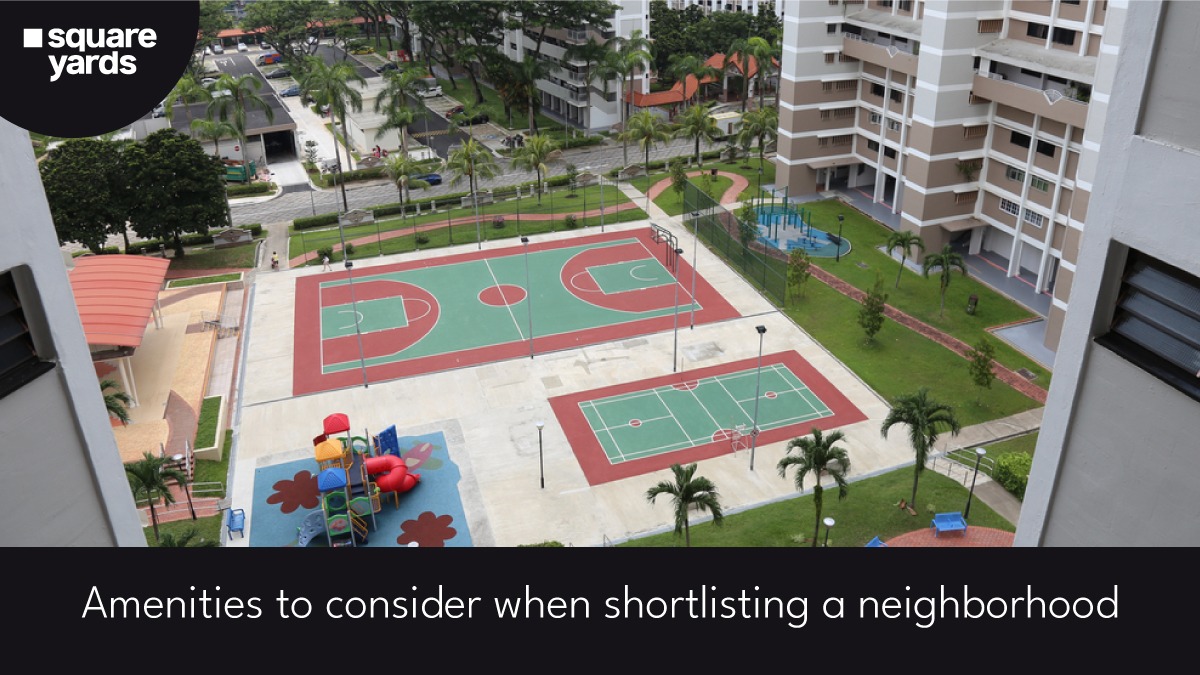
We all desire to own a home. Considering our emotions and finances, it's a significant choice we make. Buying a home involves a complex process, starting from using our hard-earned savings, getting approval from the bank, and finding the perfect home or a reliable real estate agent to help us. However, we often forget to consider the list of amenities that an apartment should have. If you buy an apartment without checking the amenities first, you might regret your decision later. Soon after moving in, you might search online for better deals and apartments in the area. Knowing about the essential amenities an apartment should have for a peaceful life is important to avoid this situation. Top 10 Amenities to Look for in a Locality There's no denying the importance of amenities in the construction industry. Some conveniences are mandatory, while others are nice but unnecessary. Including these conveniences is obligatory and listed below - Location If you're considering buying a home for yourself, then location is the most important factor. Before settling on a home, you must consider several factors, such as the quality of the social infrastructure, the roads and connectivity, the availability of public transportation, schools and hospitals, and so on. Good Ventilation and Natural Sunlight We recommend choosing a home with no shared walls. This would help you get fresh air and sunlight into your home, and you won't feel congested by the presence of other homes in the neighbourhood. Also, you would have privacy by not having shared walls. Power Backup If you have picked an apartment on a higher floor, experiencing power outages and disruptions regularly can be a significant nuisance in day-to-day life. When electricity is disrupted, it will be extremely challenging for elderly individuals to navigate the stairs. It is of the utmost importance to have a power backup system in the common rooms and the elevator. Therefore, when deciding on an apartment, consider this factor carefully. Parking Amenities A big issue, many people deal with is not having enough parking spaces. It's crucial to ensure that the new place you're considering moving to has sufficient parking spots for all your vehicles, like cars and any other vehicles you have. Sometimes, you might have to search just to find a good parking space. Security Ensuring security is crucial because we can't be at home daily to protect our valuable belongings like cars, jewellery, and money. That's why, when choosing a home, it's really important to check if the vicinity has good security systems that meet the people's needs. It is important to have safety precautions like security cameras, fire extinguishers, elevators, and guards available around the clock. These measures will provide a sense of complete safety for both you and your belongings where you live. Play Area When choosing an apartment, it's important to consider having a dedicated play area for kids. This is especially important unless the apartment is specifically designed for older people. Modern house layouts often include child-friendly features like swing sets and sand pits. Balconies Having balconies in a house is important because they offer extra space to engage in various activities like practising yoga, doing laundry, and drying clothes. In many apartments, balconies are designed to receive sunlight or provide shelter and shade. Therefore, it is recommended to consider purchasing a home that has spacious balconies. Societal Amenities Power Transformer Your apartment should have a separate power transformer to avoid the huge load consumed by the apartment complex from travelling to a shared transformer at the street corner. The electricity board usually requires this before connecting the flat block to the electrical grid. However, it's a good idea to double-check and confirm. GYM/Clubhouse If you're moving into a complex that bills itself as a "luxury apartment complex" or "housing society," it should meet this expectation or requirement of a clubhouse. Amphitheatres, dance clubs, and fitness centres are not luxuries for the average city inhabitant; they are necessities. Water Supply and Other Amenities It is essential to consider the water supply availability in your home. Insufficient water can create various difficulties in your everyday life. Therefore, purchasing a house with water storage options like underground or above-ground tanks or any other type of water storage facility is advisable. Important Factors/ Amenities to Consider in a Location Factors Description Centrality The price of a house mainly relies on its location within the city or town where you decide to live. In areas with less land to spare, populated urban areas tend to be more expensive than less populated areas. Neighbourhood Choosing desirable areas will largely be up to your tastes and preferences. However, there are a few essential features that all outstanding neighbourhoods share: convenience, attractiveness, and facilities. The size of the lot on which your house is constructed may also be regulated by the surrounding area. Development Home prices in an area can significantly increase if plans for new schools, hospitals, public transportation, and other municipal infrastructure are in the works. Location The location is an important factor when choosing a property or home. If you buy a house in an area where no new developments are planned, the price of your property will not go up. That's why it's a good idea to buy a property with plans for future projects and good infrastructure and amenities. This way, you won't face any difficulties when you decide to sell it in the future. Summary We have mentioned several factors to consider while looking for a good place to live. Talk to people living in the area where you plan to move. They can give you honest information about the place and its facilities. You could also contact a few local real estate agents for the best properties based on your needs and preferences. They have extensive expertise and can help you get the region's best and most lucrative spots. However, you should remember that you must also research beforehand. FAQs Facilities can significantly impact the quality of life in a community. The availability and quality of various facilities contribute to the overall well-being, convenience, and satisfaction of community members. The provision of convenience, accessibility, and possibilities for recreation, education, and healthcare all play a significant part in the amenities' contribution to the overall quality of life. They contribute to a life that is more complete and satisfying overall. Your requirements and tastes should guide how you rank the various conveniences. Consider the features and conveniences that complement your way of life and satisfy your family's needs. When designing the perfect setting for people to live in, striking a balance between the various conveniences available is critical. Remember that different individuals have different needs and preferences. You should assess your needs, preferences, and priorities to determine which feature to emphasise when choosing a neighbourhood. Conducting research online, paying a visit to the neighbourhood, and conversing with locals are all great ways to evaluate the variety and standard of the community's amenities. In addition, websites run by local governments, real estate agents, and community forums can all be excellent sources of information regarding the amenities offered in a certain location. You can also research future development projects to know about new amenities, improvements to existing facilities, or potential changes in the neighbourhood's infrastructure.
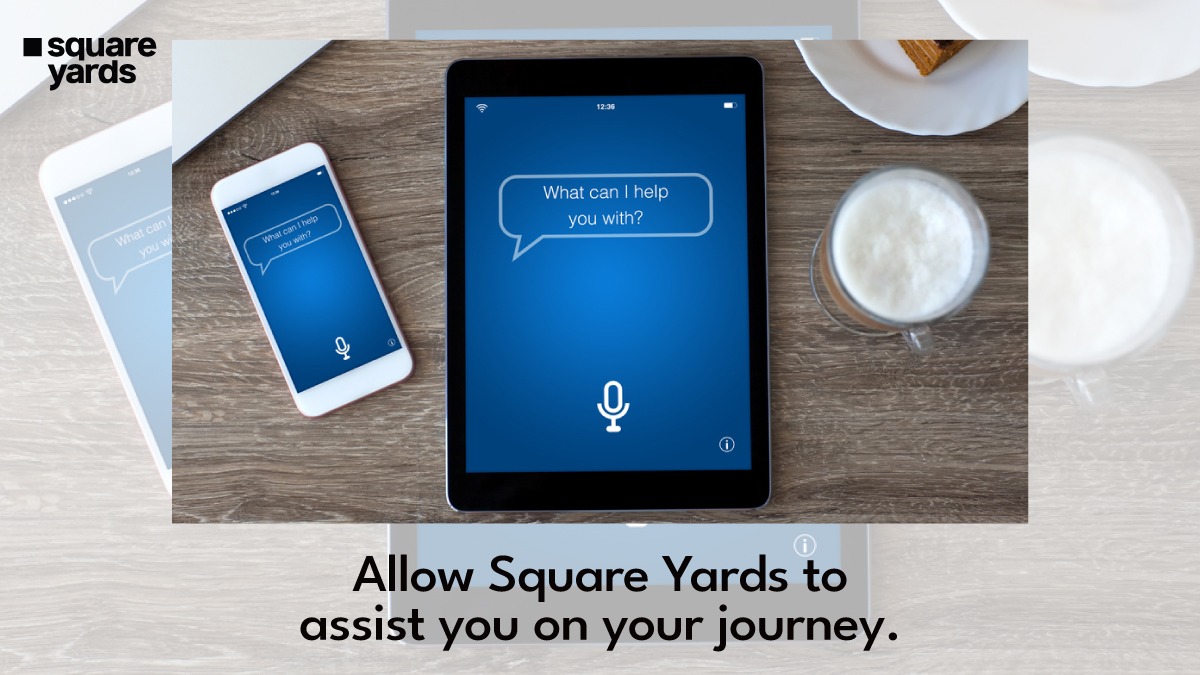
Looking for a property is more than just finding a house or land to invest in. It's about finding a comfortable place to live, planning for a secure future, and ensuring your family is happy and has privacy. So, you shouldn't take property search lightly, especially when many options are available, but not all are trustworthy or a good investment. Buying and selling property difficulties can be resolved when you work with a real estate professional like Square Yards. Let's see how Square Yards makes real estate transactions easier for you. How We Help Buyers With Their Real Estate Needs? Looking for a new property is not as simple as it sounds. You will find a never-ending wave of properties online, but choosing the best option is tedious. That's where Square Yards can help you. The below-mentioned are the benefits of finding a property through Square yards. Authentic listings only At Square Yards, you will find only authentic listings. All the properties listed here are well-inspected. The inspection involves thorough research and analysis of property infrastructure, government registration, locality inspection, developers' licence, etc. Therefore, you will find only trusted sellers at Square Yards. Wide variety of deals Square Yards is India's most renowned platform for all your real estate requirements. It displays the finest selection of properties for sale or rent. You will find residential apartments, commercial units, independent houses, warehouses, showrooms, plots, and projects in progress. Covers all you need to know The experts at Square Yards provide well-researched information regarding the property's infrastructure, locality, neighbourhood, nearby amenities, indoor and outdoor facilities, reviews, rental trends, sale prices, floor plans, etc. The availability of this information will save you time and effort, simplifying the entire process. Personalised property options Square Yards offer tailored solutions for their property needs. You can customise your search according to location, commute options, nearby facilities, property type, property size, and budget. Customisation allows you to get the deals you want to see. The Wishlist feature helps you save the shortlisted properties. Assistance in legal hassles The primary merit of hiring a real estate expert is assistance with legal issues. Square Yards provide step-by-step guidance and support for all the paperwork and legal issues. It assists in property taxation, registration, transaction process, rental agreement, and home loan. Additional services and benefits Buying a new home are not enough to live comfortably. One needs a lot of other services, like packers and movers, interior and furnishing, solar rooftop, etc. Square Yards provide all the services. It also helps with the vastu of the house. Although services offered by Square Yards effectively benefit the buyers, it is a trustworthy and excellent platform for property sellers. The Advantages of Selling Property through Square Yards Selling property is tiring because it involves marketing, legal process, networking, and many other things. The good part is you don't have to handle all these tedious tasks when you sell your property through Square Yards. The reasons to sell property through Square Yards include; Impressive audience reach Square Yards boast over 7 million monthly traffic. It has an excellent reach that attracts the best buyers for your property and speeds up the selling process. We utilise powerful AI tools to boost the property reach and connect with genuine buyers. Team of real estate experts India's largest integrated platform is connected with over 1,50,000 real estate agents and 500+ real estate developers. It has a team of experts to simplify the complexities in real estate deals and ensure the best result. Therefore, you get 100% satisfaction when you sell your property through Square Yards. Marketing Services We understand the value of customer satisfaction, their hard-earned money, time, and requirements. Therefore, our experienced professionals provide the best marketing services to sell the property. We have SEO-optimised blogs, excellent social media marketing strategies, in-app marketing tools, and praiseworthy word-mouth promotion skills. Assistance at every step At Square Yards, sellers never feel abandoned at any step of a real estate deal. We assist throughout the process, whether finding the right buyer or handling the paperwork. Services Offered The services at Square Yards are not only buying, selling, and renting the property. We have a lot to offer that helps the clients in the best possible way. The below-listed table will make it easier for you to understand our services. Services Features Property Identification Tailored and customised property search, research solutions, locality information, locality comparison, site visit, listing and buying support. Paperwork Support The home loan facility, mortgage evaluation, escrow solutions, loan assistance, taxation support, legal formalities, and property registration services. Pricing support Negotiation, budget-friendly research, Loan facilities, and transaction. After-sale/purchase service The post-handling agreement, logistic management, mortgage disbursement, home furnishing services, interior and Vastu services. Ease Your Real Estate Research through Square Yards Square Yards is a globally reputed platform that helps people find the ideal real estate deal across several countries, including Canada, UAE, Australia, etc. We are known for providing authentic deals, best customer support, and expert guidance. We work consistently to reduce the strain of real estate struggles. Therefore, Square Yards is the best platform to find your next property and buyer. FAQs You will only find government-registered and thoroughly inspected properties at Square Yards. Our team members visit the site and check all the paperwork to ensure 100% reliability. Moreover, we provide 360° virtual home tours and all other details on the website for clients' satisfaction. Therefore, it is the best platform to find authentic properties. You can also mail us any doubts or concerns about the property. Before listing or finalising a property deal, register at Square Yards. The registration process is very simple to create an account using an email ID. After completing the profile, you can search property locality-wise using the search bar or select the tab at the topmost left to find residential or commercial properties for rent, sale, or resale. Once you get the search result, you can sort it according to your requirement. You can connect with Square Yards through the toll-free number available on the website, i.e., 1800 208 3344. The existing clients can email their query issues to customercare@squareyards.com, or you can write to us at connect@squareyards.com. In addition, you can reach out to us on our social media pages, i.e. Facebook and Youtube. Our team members are always ready to assist you and solve your queries.
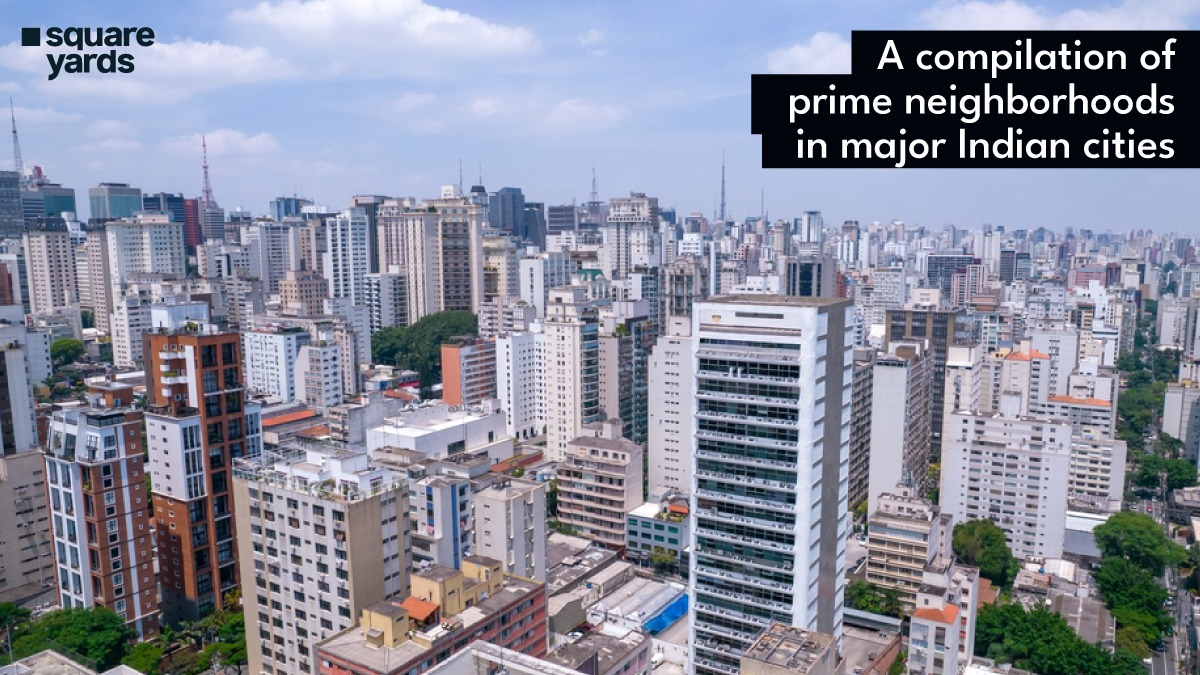
Finding the perfect locality out of best localities to rent a home is a crucial decision that can greatly impact your quality of life. With many options available in major cities across India, it's essential to comprehensively understand the top localities before choosing. Are you searching for an ideal locality? Look no further! This tenant's guide provides valuable insights into some of the most sought-after localities in major Indian cities. Whether you prioritise safety, accessibility, or vibrant social scenes, this directory will help you make an informed decision that suits your lifestyle. Which are the Major Cities and Why? Major Cities Why? Mumbai A bustling hub of ambition and opportunities, vibrant nightlife, and diverse communities Delhi Rich history, grand monuments, diverse cultures, and the political heart of the nation Banglore Leading IT hub, vibrant startup culture, pleasant weather, and a cosmopolitan lifestyle Chennai Rich cultural heritage, renowned educational institutions, and serene coastal charm Kolkata Old-world charm, intellectual and artistic heritage, and a delightful gastronomic scene List of Best Localities in Major Cities Mumbai: The City of Dreams Bandra: A vibrant suburb with excellent connectivity, bustling nightlife, and a diverse community. Powai: An upscale neighbourhood known for its serene lakeside views, IT hubs, and proximity to educational institutions. Andheri West: Popular among aspiring actors and professionals, this locality offers a lively atmosphere, ample entertainment options, and excellent transportation networks. Things to keep in mind while Renting property in Mumbai: In Mumbai, be prepared for higher rental prices compared to other cities in India. Consider sharing accommodations or opting for slightly smaller spaces to manage costs. Due to the city's heavy monsoon season, ensure the rental property is adequately waterproofed to avoid water leakage issues. Mumbai's local train network is a convenient mode of transportation. Consider choosing a locality close to a train station for easier commuting. Some localities in Mumbai have restricted parking spaces. If you own a vehicle, inquire about parking facilities or consider renting a property with a designated parking spot. Delhi: The Capital's Finest South Delhi: Known for its affluent lifestyle, this area boasts upscale neighbourhoods like Vasant Vihar and Greater Kailash, which blend modern amenities and green spaces. Dwarka: A planned sub-city with wide roads, residential complexes, and proximity to the airport, making it an attractive choice for families. Gurgaon: An emerging corporate hub with luxurious apartments, world-class shopping malls, and a thriving social scene. Things to Remember while Renting Property in best localities of Delhi: Choose accommodations with proper insulation and temperature control options to ensure comfort throughout the year. Pollution can be a concern in Delhi, especially during certain seasons. Consider properties with air purifiers or proximity to parks and green spaces for better air quality. Familiarise yourself with Delhi's different zones and areas, as they can have varying levels of infrastructure, amenities, and safety. Be cautious of areas prone to waterlogging during monsoons and consider properties with proper drainage systems. Bangalore: The Silicon Valley of India Indiranagar: A trendy locality known for its upscale residential options, popular pubs, and proximity to IT hubs. Koramangala: A vibrant neighbourhood with a youthful vibe renowned for its shopping streets, eateries, and startup culture. Whitefield: A preferred choice for IT professionals due to its proximity to major IT parks, international schools, and shopping centres. What should you keep in mind while Renting property in best localities of Bangalore? Bangalore's traffic congestion can be significant, so choose a locality close to your workplace or educational institution to minimise commute time. Bangalore's rental market can be highly competitive, especially in areas close to major IT parks. Start your search early and be prepared with the necessary documents and references. Check for power backup facilities in rental properties, as Bangalore may experience occasional power outages. Bangalore is known for its pleasant climate, but certain areas may be prone to water scarcity during summer. Inquire about the water supply situation in your preferred locality. Chennai: The Cultural Capital Adyar: A prime residential area known for its educational institutions, serene beaches, and proximity to the IT corridor. Nungambakkam: A bustling neighbourhood with a mix of residential and commercial spaces renowned for its fine dining restaurants and luxury hotels. Velachery: Located close to IT parks and the OMR (Old Mahabalipuram Road), this locality offers a balanced lifestyle with easy access to amenities. Things to Keep in Mind While Renting Property in best localities of Chennai: Chennai experiences hot and humid weather, so consider accommodations with proper ventilation and cooling systems like air conditioning or fans. Check for water availability and inquire about the frequency of water supply in the locality, as Chennai may face water scarcity issues during certain periods. Chennai has a well-connected public transportation system, including buses and suburban trains. Consider choosing a locality with easy access to public transport for convenient commuting. Remember that some areas in Chennai are prone to flooding during heavy rains. Research the flood-prone zones and avoid renting properties in those areas. Kolkata: The City of Joy Salt Lake City: A well-planned satellite town with numerous residential complexes, parks, and proximity to major IT hubs. Ballygunge: Known for its rich heritage, this area offers a blend of old-world charm and modern amenities, including high-end restaurants and shopping destinations. Rajarhat: An upcoming locality with a surge in real estate development, renowned for its IT parks, shopping malls, and affordable housing options. Things to Keep in Mind While Renting Property in Best Localities of Kolkata: Kolkata experiences a pleasant climate, but it can get hot and humid during certain periods. When looking for accommodations, consider properties with proper ventilation and cooling systems like air conditioning or fans to ensure comfort. Due to water scarcity issues in Kolkata, it is essential to check for water availability and inquire about the frequency of water supply in the locality you are considering. This will help you plan accordingly and avoid any inconveniences. Kolkata has a well-established public transportation system, including buses, trams, and the metro. Choosing a locality with easy access to public transport can make your daily commute more convenient and efficient. Certain areas in Kolkata are prone to waterlogging and flooding during heavy rains. Before finalising a rental property, research the flood-prone zones in the city and avoid renting in those areas to minimise the risk of inconvenience or property damage. Tips for Tenants Understand the legal requirements and documentation needed for renting the property. Consider the locality's proximity to essential amenities like schools, hospitals, and shopping centres. Inspect the property thoroughly, considering factors like construction quality, maintenance, and potential renovations. Familiarise yourself with the local property laws and regulations to ensure a smooth Renting process. Consider factors like water availability, power backup provisions and services offered on the property. To Sum Up Choosing the right locality is crucial for a fulfilling living experience. Each city in India offers unique localities with charm and advantages. Whether you seek a vibrant social scene, easy access to workplaces, or a serene environment, the top localities mentioned in this tenant's guide provide a starting point for your search. Remember to consider connectivity, safety, amenities, and lifestyle preferences. With this comprehensive knowledge, search for the perfect locality and create a home that suits your needs and aspirations in one of India's major cities. FAQs Yes, renting a property typically involves legal requirements. Tenants must often provide identification documents and proof of income and sign a rental agreement. It's important to understand the terms and conditions outlined in the agreement, such as rent payment, duration, and maintenance responsibilities. It is advisable to consult with a lawyer or seek guidance from a reputable real estate agency to ensure compliance with local rental laws. Safety and security can be ensured by considering the locality's crime rate, the building's security measures, and surveillance systems. Opting for gated communities or apartments with security personnel can offer an added layer of protection. Installing basic safety features like sturdy locks and smoke detectors is also recommended. Additionally, familiarise yourself with emergency protocols and contact details of local authorities. Consider the amenities and facilities that align with your lifestyle. These may include parking spaces, gymnasiums, swimming pools, community spaces, parks, or play areas. Check for the availability of essential utilities like water supply, electricity, and proper waste management systems. Access to nearby schools, hospitals, shopping centres, and public transportation contributes to the convenience of daily living. Prioritise your requirements and assess the property's offerings accordingly.
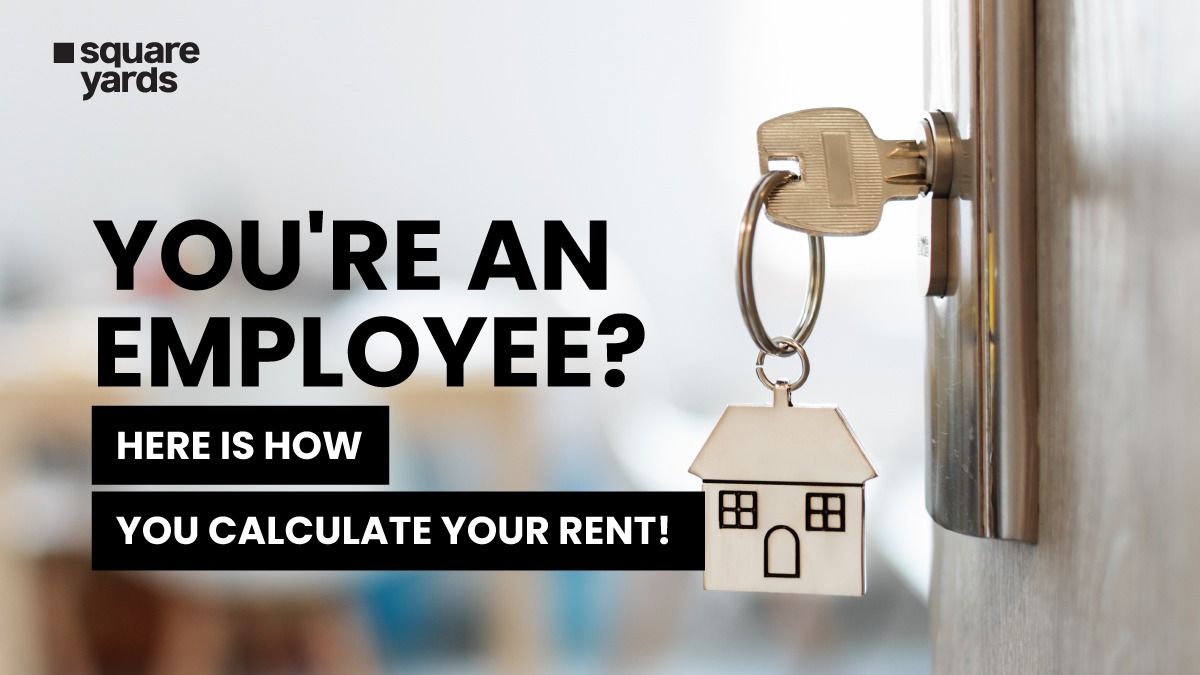
Finding the right rental property that fits within your budget is crucial for a comfortable and stress-free living experience. Calculating how much amount you spend on rent allows you to determine how you can manage your other expenses without compromising your financial stability. This guide will provide you with some helpful tips to calculate rental affordability effectively. Determine Your Monthly Income The first step in calculating your rental expenditure is to assess your monthly income. Take into account your salary, wages, and any other sources of regular income. It's important to have a clear understanding of the amount you earn on a monthly basis before proceeding further. Consider the 30% Rule A common guideline is to allocate no more than 30% of your monthly income towards rent. This rule helps ensure that your housing expenses remain manageable and leaves room for other essential expenditures and savings. Calculate 30% of your monthly income and use it as a benchmark to gauge rental expenditures. Amount for Other Monthly Expenses While rent is a significant expense, it's essential to consider other monthly expenses as well. Make a comprehensive list of your recurring bills, including utilities, groceries, transportation costs, insurance premiums, and any outstanding debt payments. Deduct these expenses from your monthly income to determine the maximum amount you can comfortably allocate towards rent. Consider Your Long-term Financial Goals It's crucial to consider your long-term financial goals when calculating rental affordability. Assess your savings objectives, debt repayment plans, and other financial commitments. Striking a balance between your housing expenses and your overall financial objectives will help you maintain a healthy financial outlook. Factor in Renters Amount Insurance Renters insurance is an important aspect to consider when calculating rental affordability. Though it may be an additional expense, it provides valuable coverage and protects your personal belongings. Include the cost of renters insurance when assessing your overall affordability. Be Realistic About Location The location of a rental property plays a significant role in determining its cost. Properties in prime or highly sought-after areas tend to have higher rental prices. Consider your preferred location, weighing it against your budget. It may be necessary to adjust your expectations or explore neighboring areas to find more affordable options. Use Online Tools and Amount Affordability Calculators Take advantage of online tools and rent affordability calculators available on various real estate websites. These tools consider your income, expenses, and location to provide an estimate of how much you can afford to spend on rent. They can be helpful in providing a starting point for your search. Conclusion Calculating rental affordability is a crucial step in finding a rental property that aligns with your financial situation and long-term goals. By considering your income, expenses, location, and long-term objectives, you can determine the maximum amount you can comfortably allocate towards rent. Remember to be realistic and prioritize financial stability when making your decision. Happy house hunting! FAQs Calculating rental affordability helps you determine how much you can comfortably spend on rent without straining your finances. It ensures that you can cover your housing expenses while maintaining a healthy financial balance. If your income fluctuates, it's advisable to calculate an average monthly income based on your earnings over a specific period. This will provide a more realistic estimate for rental affordability. While rent affordability calculations typically focus on the base rent amount, it's important to factor in utilities as well. Consider the average cost of utilities in the area you're considering and include it in your overall budget.

Choosing a rental property is an important decision that requires careful consideration. Whether you're a first-time renter or an experienced tenant, finding the right rental property can greatly impact your living experience. Our guide will help you through the process of selecting a rental property that suits your needs and preferences. So, let's dive in and discover how to choose the perfect rental property that will make you feel right at home. Understanding Your Needs Before you start your search for a rental property, it's essential to have a clear understanding of your needs and priorities. Consider factors such as the number of bedrooms and bathrooms required, preferred location, proximity to amenities, and any specific features or preferences you may have. By defining your needs upfront, you can narrow down your options and focus on properties that align with your requirements. Location, location, location The location of your rental property plays a crucial role in your overall living experience. Consider factors such as proximity to your workplace, educational institutions, shopping centers, healthcare facilities, and public transportation. Additionally, evaluate the neighborhood's safety, cleanliness, and the availability of recreational areas. Choosing a convenient location will save you time and make your daily routines more manageable. Setting a Realistic Budget for Rental Property Establishing a realistic budget is vital when searching for a rental property. Determine how much you can comfortably afford to spend on rent each month while still covering your other expenses. Experts suggest allocating no more than 30% of your monthly income to housing costs. Take into account additional expenses such as utilities, parking fees, and maintenance costs. Setting a budget will help you narrow down your options and avoid financial strain. Evaluating Rental Property Amenities Consider the amenities offered by different rental properties. Some common amenities include fitness centers, swimming pools, laundry facilities, on-site maintenance, and 24/7 security. Make a list of amenities that are important to you and prioritize them accordingly. Remember that properties with more amenities often come with higher rental rates, so strike a balance between your desired amenities and your budget. Considering the Lease Terms of Your Rental Property Carefully review the lease terms before signing any rental agreement. Pay attention to details such as the duration of the lease, penalties for early termination, and rent increase policies. Ensure that the lease clearly outlines the responsibilities of both the tenant and the landlord. If you have any concerns or questions regarding the lease terms, seek clarification from the landlord or a legal professional. Inspecting the Property When visiting potential rental properties, thoroughly inspect the premises. Look for any signs of damage or disrepair, such as leaky faucets, broken windows, or faulty electrical outlets. Ensure that all essential appliances are in working condition. If you notice any issues, inform the landlord or property manager and discuss their resolution before signing the lease. Assessing the Neighborhood Before committing to a rental property, take the time to explore the neighborhood. Observe the cleanliness of the surroundings, the presence of parks or recreational areas, and the general atmosphere. Talk to current residents if possible and inquire about their experiences living in the area. Assessing the neighborhood will give you insights into the community's dynamics and help you determine if it aligns with your lifestyle. Safety and Security Measures Your safety should be a top priority when choosing a rental property. Inquire about the security measures in place, such as surveillance cameras, secure entry systems, and well-lit common areas. Additionally, consider the presence of smoke detectors, fire extinguishers, and emergency exit routes. Feeling safe and secure in your rental property will provide peace of mind and a comfortable living environment. Checking Maintenance of Your Rental Property It's important to know how maintenance and repairs are handled by the landlord or property management company. Inquire about their responsiveness to repair requests and their policy for handling emergencies. A reliable landlord or property manager will promptly address any maintenance issues that may arise during your tenancy, ensuring a comfortable and well-maintained living space. Understanding Landlord Policies Familiarize yourself with the landlord's policies regarding important aspects such as late rent payments, subletting, and pet policies. Ensure that their policies align with your needs and preferences. If you have any concerns or special requests, address them with the landlord before signing the lease to avoid any potential conflicts or misunderstandings in the future. Conclusion Choosing the right rental property requires careful consideration and research. By understanding your needs, evaluating the location, setting a realistic budget, and thoroughly inspecting the property, you can make an informed decision that suits your lifestyle. Remember to consider factors such as amenities, lease terms, safety measures, maintenance policies, and the reputation of the landlord. By following these guidelines, you'll be well on your way to finding the perfect rental property that meets your requirements and provides a comfortable living experience. FAQs To determine your rental property needs, consider factors such as the number of bedrooms and bathrooms required, preferred location, proximity to amenities, and any specific features or preferences you may have. By clearly defining your needs, you can narrow down your options and find a rental property that aligns with your requirements. The location of your rental property is crucial as it affects your overall living experience. Consider factors such as proximity to your workplace, educational institutions, shopping centers, healthcare facilities, and public transportation. Choosing a convenient location will save you time and make your daily routines more manageable. To set a realistic budget for a rental property, determine how much you can comfortably afford to spend on rent each month while still covering your other expenses. Consider allocating no more than 30% of your monthly income to housing costs. Remember to account for additional expenses such as utilities, parking fees, and maintenance costs.
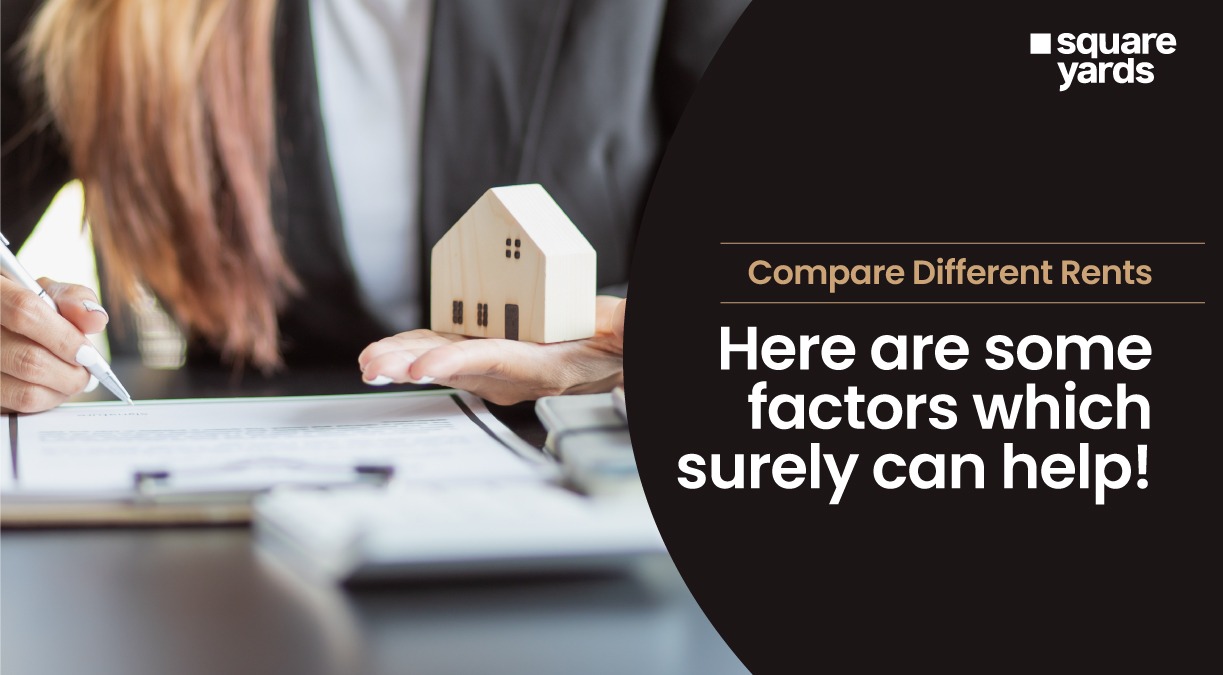
When searching for a rental property, comparing rents is a crucial step in the decision-making process. Rent prices can vary significantly based on factors such as location, property type, amenities, and market conditions. To ensure you make an informed choice and find the best value for your budget, it's important to look into certain aspects, so that you are better equipped to evaluate different rental options and choose the one that meets your needs and financial capabilities. Know the Market : Rents Variation Before comparing rents, it's important to have a general understanding of the rental market in the area you're interested in. Research the average rental prices for similar properties in the neighborhood to establish a benchmark. This will help you identify any significant deviations from the average and evaluate the competitiveness of the rents you come across during your search. Check out the Neighborhood The location of a rental property plays a significant role in its rental price. Desirable neighborhoods or areas with excellent amenities and proximity to schools, shopping centers, and public transportation often command higher rents. Consider your preferences and needs regarding location and weigh them against the associated rental costs. Remember to assess the neighborhood's safety, cleanliness, and overall quality of life to ensure it aligns with your expectations. Property Type and Size for Appropriate Rents Different property types and sizes come with varying rental prices. For instance, apartments might be more affordable than single-family houses. Evaluate the type and size of the property you require based on your lifestyle, family size, and preferences. Consider the number of bedrooms, bathrooms, and overall square footage to determine if the rent is reasonable and justifiable. Amenities and Facilities Rental properties with additional amenities and facilities often come at a higher cost. Consider the amenities that are important to you, such as parking spaces, laundry facilities, fitness centers, swimming pools, or community spaces. Compare the rental prices of properties offering similar amenities to assess if the additional cost is justified based on your priorities and lifestyle. Lease Terms and Flexibility When comparing rents, it's essential to evaluate the lease terms and flexibility offered by the landlords or property management companies. Factors to consider include the lease duration, renewal options, rent increase policies, and any penalties for breaking the lease. Look for rental agreements that align with your needs and provide a reasonable level of flexibility. Utilities and Additional Expenses Inquire about the inclusion of utilities and other additional expenses in the rental price. Some properties may include water, electricity, or internet services in the rent, while others require tenants to pay for these separately. Assess the overall cost of utilities and additional expenses to accurately compare rents and determine the total financial commitment of each rental option. Rents Condition and Maintenance of the Property The condition and maintenance of the property can impact its rental price. Well-maintained properties that are in good condition and require minimal repairs may justify a higher rent. Conversely, properties in need of significant repairs or lacking proper maintenance should be reflected in a lower rental price. Take note of the property's condition during inspections and factor it into your comparison. Rents, Landlord or Property Management Reputation Consider the reputation and track record of the landlord or property management company when comparing rents. Read reviews or speak to current or previous tenants to gather insights into their responsiveness, professionalism, and overall satisfaction. A reliable and reputable landlord or property management team can provide a better rental experience, making the slightly higher rent worthwhile. Availability of Parking Parking availability is a crucial factor for many renters, especially in urban areas. Assess if the rental property provides dedicated parking spaces, whether they are included in the rent or come at an additional cost. Take into account the convenience and safety of parking options when comparing rents. Conclusion Comparing rents requires a systematic evaluation of various factors to ensure you find the right rental property at a fair price. Consider the rental market, location, property type, amenities, lease terms, additional expenses, condition, landlord reputation, parking availability, and, most importantly, your personal preferences and budget. By carefully assessing and comparing these factors, you can make an informed decision and secure a rental property that meets your needs and offers good value for your money. FAQs Determining a fair rental price involves considering factors such as location, property type, amenities, market conditions, and comparing it to the average rents in the area. Conduct thorough research and assess the value offered by the property to ensure the rent aligns with its features and market demand. Yes, several online resources and websites provide rental price comparisons for different areas and property types. Websites like Square Yards, Magic Bricks, 99 acres offer comprehensive rental listings with pricing details. These platforms allow you to refine your search and compare rents based on specific criteria. Lease terms play a crucial role in your rental experience. Consider factors such as lease duration, renewal options, rent increase policies, and penalties for breaking the lease. Choosing a rental property with favorable lease terms can provide flexibility and peace of mind throughout your tenancy.

Renting a property is a common practice in India, and negotiating the rent with a landlord can help you secure a favorable deal that aligns with your budget and needs. While rental prices in India can vary depending on location, property type, and market conditions, it's important to know how to effectively negotiate with landlords to achieve a fair rental agreement. In this article, we will provide you with practical tips and strategies on how to negotiate rent with a landlord in the Indian context, empowering you to secure a rental property at a reasonable price. Understand the Rental Market in Your Area Before entering into negotiations, it's crucial to have a solid understanding of the rental market in your specific area. Research the average rental prices for similar properties in the neighborhood or locality where you're interested in renting. This will provide you with a benchmark to assess the reasonableness of the initial rent proposed by the landlord. Do Your Research on Rental Prices In addition to understanding the rental market, conduct thorough research on rental prices for similar properties in the area. Utilize online platforms, real estate websites, and local classifieds to gather information about recent rental transactions. This data will empower you with insights and evidence to support your negotiation and make a compelling case for a fair rental price. Highlight Your Positive Attributes Before Trying To Negotiate When negotiating with a landlord, emphasize your positive attributes as a tenant. Highlight your stable income, responsible rental history, and good references from previous landlords. Demonstrating that you are a reliable tenant can strengthen your position and encourage the landlord to consider your request for a lower rent. Point Out Property's Unique Challenges or Issues If you notice any unique challenges or issues with the property, such as maintenance concerns or outdated amenities, politely bring them to the landlord's attention during the negotiation. Explain how these factors may affect the rental value and offer a reasonable justification for a reduced rent. However, it's important to approach this aspect tactfully to maintain a positive rapport with the landlord. Be Prepared to Compromise in Negotiate Negotiations often require compromise from both parties. While you may have a specific rental price in mind, be open to negotiation and consider alternative proposals from the landlord. This flexibility can help create a mutually beneficial agreement. For instance, you could propose a longer lease term or offer to take care of minor repairs in exchange for a lower rent. Negotiate with Respect and Professionalism Maintain a respectful and professional attitude throughout the negotiation process. Be prepared, articulate, and confident when presenting your case. Avoid being confrontational or aggressive, as this can hinder productive discussions. Remember, a positive relationship with the landlord can lead to a smoother renting experience. Seek Professional Assistance if Needed If you are unsure about the negotiation process or feel overwhelmed, consider seeking professional assistance. Real estate agents or property consultants can provide valuable insights and negotiate on your behalf. While their services may come at a cost, their expertise can help you secure a more favorable rental agreement. Conclusion Negotiating rent with a landlord in India requires preparation, research, and effective communication. By understanding the rental market, conducting thorough research, highlighting your positive attributes as a tenant, and being prepared to compromise, you can increase your chances of securing a fair rental agreement. Remember to maintain professionalism and seek professional assistance if needed. With these strategies in mind, you'll be better equipped to negotiate rent with a landlord and find a rental property that suits your budget and preferences. FAQs Yes, it is common to negotiate rent with landlords in India, especially in areas where rental prices are not fixed by the government. Negotiating can help you secure a rental property at a more reasonable price that suits your budget. If the landlord is not open to negotiation, you can consider exploring other rental options or properties where the landlord is more willing to negotiate. However, keep in mind that negotiations are a two-way process, and finding a mutually agreeable solution is often beneficial for both parties. Negotiating rent can be done directly with the landlord or through an agent. It depends on your comfort level and the specific circumstances. If you choose to work with an agent, ensure they have a clear understanding of your requirements and negotiate on your behalf in a professional manner.

Moving into a rental house in India can be an exciting yet challenging process. To ensure a smooth transition and a pleasant living experience, it's important to thoroughly inspect the rental property and consider various factors before making a decision. In this article, we will guide you through the essential things to check before moving into a rental house in the Indian context. By paying attention to these key aspects, you can make an informed choice and find a rental house that meets your requirements and preferences. Review the Rental house Agreement Before moving into a rental house, carefully review the rental agreement provided by the landlord. Pay attention to the terms and conditions, including the rent amount, deposit, lease duration, and any restrictions or rules imposed by the landlord. Ensure that you understand and agree to all the clauses mentioned in the agreement. Inspect the Property's Condition Conduct a thorough inspection of the rental property to assess its overall condition. Look for any signs of damage, such as cracked walls, leaking pipes, or malfunctioning electrical fixtures. Inspect the doors, windows, and locks to ensure they are in good working condition. Take note of any existing damages and discuss them with the landlord to avoid any disputes during the move-out process. Check for Necessary Repairs or Maintenance During the inspection, identify any necessary repairs or maintenance that the rental house may require. Discuss these issues with the landlord and ensure that they are addressed before you move in. It's important to have a clear understanding of the landlord's responsibilities regarding repairs and maintenance. Ensure Rental house has Basic Amenities are in Place Verify that the rental house has essential amenities such as electricity, water supply, and proper sanitation facilities. Check the functioning of electrical outlets, switches, and plumbing fixtures. Ensure that there is adequate water pressure, and the drainage system is working effectively. If the rental house is furnished, inspect the condition of furniture, appliances, and other provided amenities. Assess the Safety and Security Measures Safety and security are paramount when choosing a rental house. Check for safety measures such as fire extinguishers, smoke detectors, and secure locks on doors and windows. Assess the surrounding area for sufficient lighting and the presence of security personnel if applicable. Your peace of mind and well-being should be a top priority. Clarify Rent and Utility Payment Details Discuss the rent payment details with the landlord, including the due date, preferred mode of payment, and any penalties for late payments. Inquire about utility payment responsibilities, such as electricity, water, and maintenance charges. Clarifying these details beforehand will help you plan your budget and avoid any misunderstandings. Understand the Lease Terms and Renewal Options Understand the lease terms and conditions, including the duration of the lease and any provisions for renewal. Clarify the process and requirements for lease renewal, as well as any potential rent increases. Being aware of these details will allow you to plan for the future and decide if the rental house aligns with your long-term goals. Verify the Landlord's Credibility It's important to verify the credibility and reputation of the landlord before moving into a rental house. Seek references from previous tenants, neighbors, or online platforms to gather information about the landlord's behavior, responsiveness, and adherence to agreements. This will give you an insight into their reliability and how they handle tenant concerns. Check the Rental House's Neighbourhood and Surrounding Facilities Consider the neighborhood and surrounding facilities when choosing a rental house. Assess factors such as proximity to essential amenities like schools, hospitals, markets, and public transportation. Visit the area during different times of the day to gauge noise levels, traffic conditions, and overall livability. Ensure that the location meets your lifestyle preferences and daily requirements. Welcome to Your New Rental House - Conclusion Moving into a rental house in India requires careful consideration and thorough inspection. By reviewing the rental agreement, assessing the property's condition, checking for necessary repairs, ensuring basic amenities and safety measures, clarifying payment details, understanding lease terms, verifying the landlord's credibility, and evaluating the neighborhood, you can make an informed decision and have a pleasant renting experience. FAQs
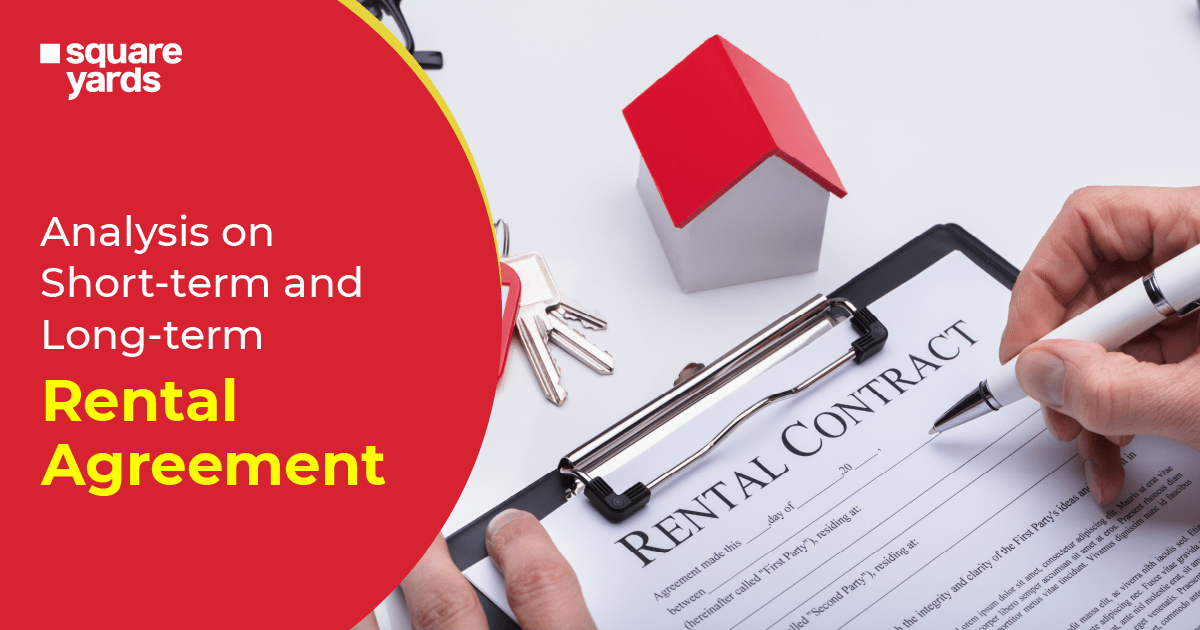
Renting a property in India involves various legal and financial considerations. One of the most crucial aspects of renting is having a rent agreement in place. A rent agreement is a legal document that establishes the terms and conditions of the rental arrangement between the landlord and the tenant. It outlines the rights, responsibilities, and obligations of both parties, providing clarity and protection. By understanding its importance and key elements, you can protect your interests and ensure a smooth and hassle-free renting experience. Legal Protection for Both Parties Having a rental agreement in place offers legal protection for both the landlord and the tenant. It sets the expectations and boundaries, ensuring that both parties understand their rights and obligations. In case of any disputes or disagreements, the rental agreement can serve as evidence in a court of law. Clarification of Rent Agreement - Terms and Conditions A rental agreement clearly defines the terms and conditions of the rental arrangement. It includes details such as the duration of the lease, rent amount, due date, mode of payment, and any additional charges or penalties. This clarity helps prevent misunderstandings and conflicts regarding the rental terms. Rent and Security Deposit Details The rental agreement specifies the rent amount, the frequency of payment, and the consequences of late payments. It also outlines the terms related to the security deposit, including the amount, conditions for refund, and deductions for damages. Having these details in writing protects both parties' interests and ensures transparency. Maintenance and Repairs Covers Rent Agreement A rental agreement addresses the responsibilities of both the landlord and the tenant regarding maintenance and repairs. It specifies who is responsible for routine maintenance and minor repairs, as well as the procedure for reporting and resolving major repairs. This clarity helps avoid disputes and ensures that the property remains well-maintained. Dispute Resolution In the unfortunate event of a dispute between the landlord and the tenant, a rental agreement provides a framework for resolving the issue. It may include provisions for mediation, arbitration, or legal action, depending on the severity of the dispute. Having a predetermined mechanism for dispute resolution can save time, effort, and legal expenses. Rent Agreement's Termination and Renewal The rental agreement outlines the process for termination and renewal of the lease. It specifies the notice period required from both parties, conditions for early termination, and the procedure for lease renewal. These provisions ensure that both the landlord and the tenant have clarity on the end of the tenancy and the possibility of renewal. Conclusion Having a rental agreement is of utmost importance when renting a property in India. It provides legal protection, clarifies the terms and conditions, addresses rent and security deposit details, establishes responsibilities for maintenance and repairs, offers a framework for dispute resolution, and outlines the process for termination and renewal. By having a comprehensive rental agreement, both landlords and tenants can safeguard their interests and have a mutually beneficial renting experience.
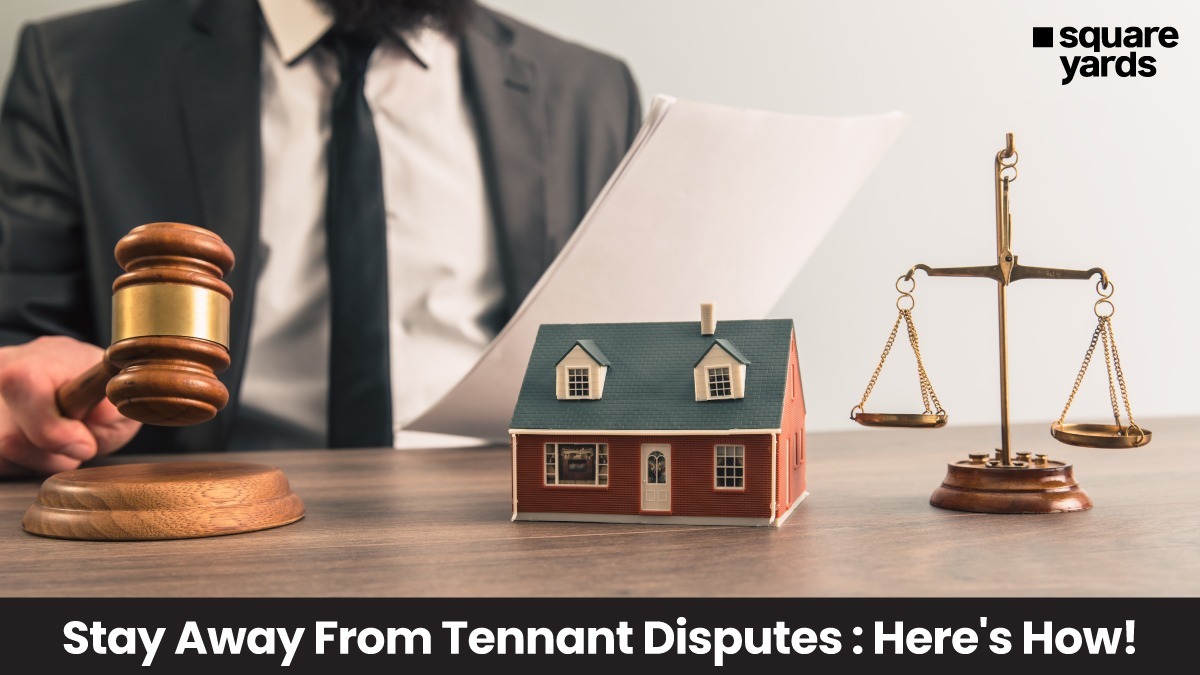
As a tenant in India, it is important to be aware of your rights and take steps to protect them. Renting property comes with certain legal and contractual obligations, and understanding your rights can help ensure a fair and secure tenancy. Today, we are going to guide you on how to protect your tenant rights, navigate the rental process with confidence and safeguard your interests. Familiarize Yourself with Tenancy Protect Laws Start by familiarizing yourself with the tenancy laws specific to your Indian state or union territory. Understanding the legal framework governing landlord-tenant relationships will help you identify your rights and obligations. Key laws include the Rent Control Act and any local regulations that may apply to your area. Review and Understand the Rental Agreement Thoroughly review the rental agreement before signing it. Pay close attention to clauses related to rent, duration of the tenancy, notice periods, and other important terms and conditions. Seek clarification from the landlord or seek legal advice if you have any concerns or questions. Maintain Proper Documentation Keep all relevant documents related to your tenancy, including the rental agreement, rent receipts, security deposit receipts, and any communication with the landlord. These documents serve as evidence in case of disputes and can help protect your rights. Pay Rent on Time Ensure that you pay your rent on time as per the agreed-upon terms in the rental agreement. Timely rent payments not only maintain a good landlord-tenant relationship but also demonstrate your commitment to fulfilling your obligations as a tenant. Keep the Property Well-Maintained Take care of the rental property and keep it in good condition. Follow any maintenance guidelines specified in the rental agreement, such as routine cleaning, garbage disposal, and taking preventive measures to avoid damage. Seek Written Permission for Modifications If you wish to make any modifications to the rental property, such as painting or installing fixtures, seek written permission from the landlord. Unauthorized modifications can result in disputes and may compromise your tenant rights. Communicate Effectively with the Landlord Maintain open and effective communication with your landlord. Notify them promptly about any issues or repairs needed in the rental property. Regular communication can help resolve problems quickly and maintain a positive landlord-tenant relationship. Report Maintenance Issues Promptly If you encounter any maintenance issues or repairs that require attention, report them to the landlord or property manager promptly. Document the communication and follow up to ensure that necessary repairs are completed within a reasonable timeframe. Deal with Disputes Amicably In case of disputes or disagreements with the landlord, try to resolve the matter amicably through communication and negotiation. If needed, involve a neutral third party, such as a mediator, to help facilitate a resolution. Seek Legal Advice, if Necessary If you find yourself facing significant issues or rights violations, seek legal advice from a qualified professional well-versed in tenancy laws. They can provide guidance on your legal rights and help you navigate complex legal situations. Conclusion Protecting your tenant rights is essential to ensure a fair and harmonious rental experience in India. If you are aware of your rights, you can protect yourself from misuse by landlords and save yourself from unlawful eviction. This guide will make you more confident as a tenant and help you redress your grievances properly.
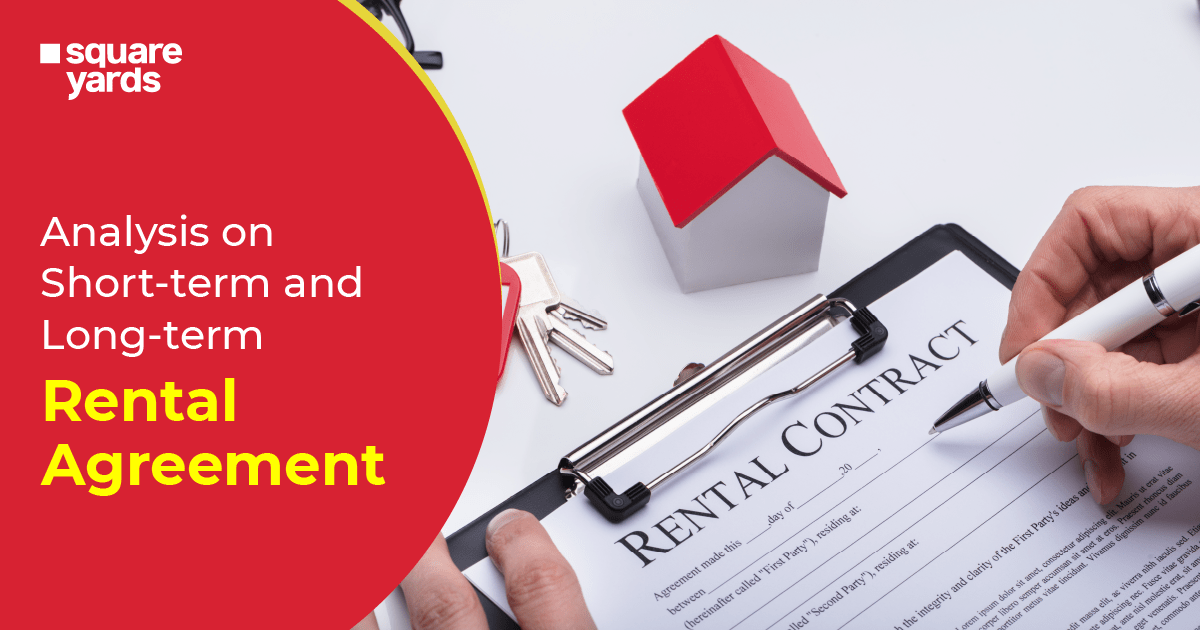
Formulating a rental agreement is a crucial step for both landlords and tenants in India. A rent agreement serves as a legal document that outlines the terms and conditions of the rental arrangement, protecting the rights and interests of both parties. Let us guide you through the process of formulating a rent agreement that covers all necessary aspects and promotes a harmonious landlord-tenant relationship. Understanding the Legal Requirements Before formulating a rent agreement, it is important to understand the legal requirements in your specific Indian state or union territory. Familiarize yourself with the applicable laws, such as the Rent Control Act or the local tenancy regulations, to ensure compliance and avoid any legal complications. Identifying the Parties and Property Details Clearly identify the parties involved in the rent agreement, including the landlord and the tenant. Include their full names, addresses, and contact details. Additionally, provide detailed information about the rental property, including its address, description, and any unique features or amenities. Specifying the Rental Agreement Terms and Conditions Specify the terms and conditions of the rental arrangement in detail. This includes the duration of the lease, whether it is a fixed-term or a periodic tenancy, and the commencement and termination dates. Clearly state the purpose of the rental property, whether it is for residential or commercial use. Addressing Rent Payment Details Outline the rent payment details, including the rent amount, payment frequency (monthly, quarterly, etc.), and the preferred mode of payment (cash, bank transfer, etc.). Mention the due date for rent payment and any late payment penalties or grace periods. It is advisable to include a clause regarding rent escalation or revision, if applicable. Outlining Maintenance and Repairs in Rental Agreement Clearly define the responsibilities of both the landlord and the tenant regarding maintenance and repairs. Specify who will be responsible for routine maintenance, such as plumbing or electrical repairs, and outline the procedure for reporting and resolving any major repairs or damages. This clarity helps avoid misunderstandings and disputes. Defining Termination and Renewal Clauses Include clauses that address the termination and renewal of the rent agreement. Specify the notice period required from both parties for termination, the conditions for early termination, and any penalties or consequences for breach of the agreement. If there is an option for renewal, outline the procedure and conditions for renewal. Seeking Legal Advice and Registration While not mandatory for all rental agreements, it is advisable to seek legal advice and consider registering the rent agreement. Consulting a lawyer can ensure that the agreement adheres to legal requirements and protects the interests of both parties. Registration offers additional legal validity and enforceability. Rental Agreement - inshort! Formulating a rent agreement in India requires careful consideration and attention to detail. By understanding the legal requirements, identifying the parties and property details, specifying rental terms and conditions, addressing rent payment details, outlining maintenance and repairs, defining termination and renewal clauses, and considering legal advice and registration, both landlords and tenants can create a comprehensive and effective rent agreement that promotes a mutually beneficial rental experience. FAQs Yes, you can use a template as a starting point for formulating your rent agreement. However, it is crucial to review and customize the template according to your specific requirements and legal obligations. Notarization is not mandatory for rent agreements in India. However, it is recommended to seek legal advice to determine if notarization or registration is necessary in your specific jurisdiction for added legal validity. If there is a disagreement or dispute related to the rent agreement, it is advisable to seek legal advice and explore mediation or arbitration options to resolve the issue amicably and avoid costly legal proceedings.











